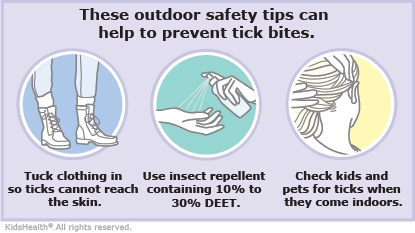Rocky Mountain spotted fever (RMSF) usually can be treated successfully with antibiotics. But with late or no treatment, RMSF can cause serious health problems.


RMSF is an illness caused by bacteria called Rickettsia rickettsii. It is spread to humans through tick bites. Usually, a tick must be attached to a person's skin for several hours in order to give someone RMSF.
Signs of RMSF usually begin within 2 days to 2 weeks of a tick bite. Often, a key sign is a rash that begins on the wrists, forearms, and ankles, and sometimes on the palms and soles. Other signs may include fever, chills, muscle aches, vomiting, red eyes, headache, belly pain, and nausea.
If RMSF is not treated, the infection can get worse. It can cause problems in the brain, heart, lungs, nerves, and other parts of the body.
The health care provider asked you and your child questions and did a careful examination. Based on this information, the health care provider believes that your child likely has RMSF and will begin treatment for this infection. Blood tests, and possibly skin tests, have been done to help make the diagnosis. Future blood tests also may be needed to confirm it.
Antibiotics usually work well to treat RMSF. Your health care provider feels your child can take antibiotics by mouth and can be safely cared for at home.



Your child:

Your child:

These outdoor safety tips can protect your whole family from future tick bites: